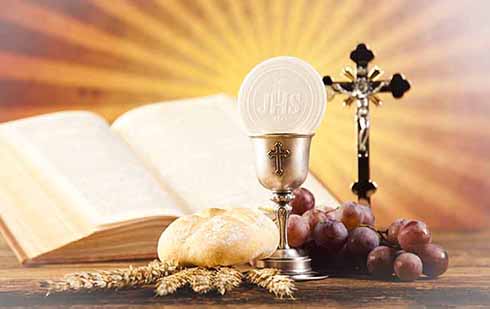 We are familiar with covenants in our secular society whereby two parties give their assent to a contract/covenant; breaking the covenant usually incurs punishment for the one who defaults, and redress for the innocent party.
We are familiar with covenants in our secular society whereby two parties give their assent to a contract/covenant; breaking the covenant usually incurs punishment for the one who defaults, and redress for the innocent party.
In the Jewish scriptures, Covenant has evolved from its mysterious urgings in Abraham and the Patriarchs through Exodus, Sinai, the Monarchy, Exile and finally Judaism until the Christian era. The whole of the Jewish Scriptures is about the Covenant (berit), but its meaning is different from secular counterparts. ?In the Exodus Tradition, the self-revelation of God to Moses under the name of Yahweh was seen as a turning point in the relationship between God and all humanity.
IN THE WILDERNESS
The journey through the wilderness was fraught with unimaginable problems for Moses. The Israelites had known only slavery; many were probably Egyptian prisoners of war; they were of ‘mixed ancestry’ (Exodus 12:38), speaking different languages. They had no common identity and would easily sink into anarchy and self-destruction. Over and over again the people strayed from the commitment they had entered into with Yahweh. Frequently, the Israelites ‘murmured’ or complained about the leadership of Moses and God. Having short memories of their Egyptian slavery, they longed for the ‘fleshpots’ of Egypt.
As the Israelites wandered through the desert on their way to the unknown Promised Land, they met many different peoples all of whom were polytheistic in their worship. The ancestral God of the Israelites was different and distinct from the gods of their neighbours. There was a theological difference: Yahweh’s distinguishing characteristic was Holiness, which entails the separation of the sacred from the profane. The Covenant demanded that the holiness of God be reflected in the holiness of the people.
PRINCIPLES BEGET BEHAVIOUR
Yahweh is holy because he does not allow worship of deities other than himself. Integral to Israel’s identity was separation as a holy people. It was imperative that the people express their belief in a ‘holy’, ‘separate’, ‘distinct’ God in their way of living. Their ethical principles had to cohere with their behaviour. Deuteronomy 27: 9-10 states explicitly: ‘Be silent, Israel, and listen! This day you have become the people of the Lord, your God. You shall obey the voice of the Lord, your God, and keep his commandments . . .’ The people had clamoured: ‘We also will serve the Lord, for he is our God.’
The Berit is virtually a one-sided covenant: God has taken the initiative by inviting the Israelites to enter into a covenant with their God. Yahweh is unfailingly constant; but the people lurch from renewal to inability to remain faithful to their covenant commitment. They had experienced God’s fidelity and mercy in good times and in bad. God pledged to be Israel’s personal protector – not only against foreign enemies, but also in times of sickness, disease and chaos.
GOD DEMANDS LOYALTY
The God of Moses is a personal God who demands loyalty, expressed through submission to the divine will. Their commitment to the Covenant is lived out in fidelity to the Ten Commandments (Torah). The Scriptures tell of the perpetual inability of the people to live up to God’s expectations.
God’s chief demand of the Israelites was simple: ‘I am the Lord thy God, thou shalt not have any strange gods before Me.’ The covenant was a gift from Yahweh and an honour for the people. This is the heart of the Hebrew scriptures; it underpinned the ministry of Jesus; it was the basis for his decision to accept death – even death on a cross rather than capitulate to the claims of the religious leaders and the Roman power breakers of his time.
Many of us are well versed in the Ten Commandments. However, the most important commandment has seldom featured at the top of our study. The first commandment states: I am the Lord, your God; do not have other gods before me. We have been so busy following the prescriptive second section of the commandments that we have failed to take seriously the Covenant to which we are called. For many, the God they inherited from their earlier years has no credibility; educated people have rejected this God. Access to scientific discoveries by young children and adults has opened up a Universe and a planet Earth that defy the religious myths of the past.
MYSTERY OF THE DIVINE
While the creation myths in Genesis were meaningful for exilic and post-exilic Jews, they are summarily dismissed by moderns and post-moderns. We have lost a sense of God, of the ineffable Mystery of the Divine who invites us individually and communally into a covenantal relationship.
In the Eucharistic Prayer of the Mass, the priest says over the cup of wine: ‘Take this, all of you, this is the cup of my blood, the blood of the new and everlasting covenant . . .’ Restoration within the Catholic Church of Covenant sacred history could revitalise the spiritual life of Catholics.
Anne O’Brien is a former Sister of St Joseph, 25 years as Pastoral Associate, psychologist, volunteer in aged care. This article first appeared in the Autumn 2019 edition of Madonna magazine.